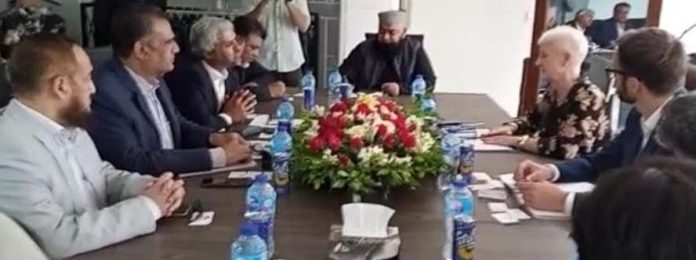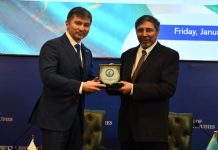ISLAMABAD, OCT 26 /DNA/ – Ambassador of the European Union Dr. Riina Kionka has called for effective implementation of the 27 international conventions as Pakistan’s present GSP Plus status is going to be reviewed in Dec 2023 and more labour and human rights conventions will be added for their implementation.
The European Union Ambassador stated this during her visit to a number of garments’ manufacturing units along with the PRGMEA executive committee members, Central Chairman Mubashar Naseer Butt and vice chairman Waseem Akhtar Khan where she also appreciated their performance, calling for product diversity and more value-addition to exploit the full potential of market access to the countries under GSP Plus present regime.
Later in a meeting held here at PRGMEA Office, both sides discussed in detail the role of SME sector in economic growth, technical education, skills development, EU support for Pakistan in TVET sector and promotion of women skilled force.
The PRGMEA and the EU agreed to work on women entrepreneurship, better labour laws and promotion of SME sector along with other projects. The ambassador discussed various ideas for providing support to the SME sector, with the focus on creating linkages within the EU to open new markets for the products.
Dr. Riina Kionka said that the EU is the biggest export market for Pakistani goods, as it accounts for about one-third of all Pakistani exports. She said the EU can assist Pakistan to expand its exports and uplift its industry through collaboration with the PRGMEA. The Ambassador appreciated the role of PRGMEA in boosting industrial activities in the region and added that her embassy would be in touch with the it to increase the bilateral ties.
Other participants of the meeting included PRGMEA ex-chairman Sajid Saleem Minhas, Dr. Mufeez ul Islam, Ahmad Hanif, Irfan Khurshid, Muhammad Ali and Hina Asif.
Addressing the meeting, PRGMEA Central Chairman Mubashar Naseer Butt and vice chairman Waseem Akhtar Khan said that Pakistan attaches great importance to its partnership with the European Union, as the European Union is one of the largest trading partners of Pakistan.
PRGMEA Central Chairman said that GSP+ has increased EU-Pakistan bilateral trade; valued at €12.2 billion 2021 as compared to €6.9 billion, representing an increase of 78%.
Mubashar Butt said that the GSP Plus status is very beneficial for the economy of Pakistan as it has played an important role in the expansion of bilateral trade. He said that trade with EU under GSP+ is of critical importance for Pakistan’s economic and social stability and prosperity. He said that GSP Plus is a constructive engagement for the betterment of our economy and promoting economic agenda. The scheme has a positive synergy with government’s social agenda. As a result of improved market access, Compound Annual Growth Rate (CAGR) for Pakistan’s exports to EU increased to 7% in the post GSP+ period as compared to 4% in the 5 years preceding GSP.
On this occasion, PRGMEA vice chairman Waseem Akhtar observed that the GSP Plus benefits to Pakistan are the tariff free access to the largest market for textile and apparel and a solid platform and incentive structure to drive further reforms in the industry and the country. In the same way, the benefits to EU are reliable, cost competitive supply of textiles to EU businesses and consumers and a sustainable, ethical and increasingly traceable textile value chain. EU-Pakistan GSP+ relationship has the power to transform Pakistan’s economy and society while delivering on EU goals, he added.
Mubashar Butt said that Pakistan’s textile and apparel industry is the backbone of the economy, constituting 8.5% of GDP, 40% of the industrial labor force and more than 60% of the country’s exports while it’s manufacturing share is 46%. The export of readymade garments exhibited an increase of 28.75% to $3.9 billion during fiscal year 2021-2022 compared with $3.03 billion in the preceding fiscal year. The Value-added Garments sector is the major tax payer, largest employment generator in the whole textile chain.

















